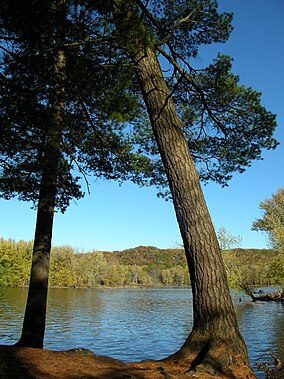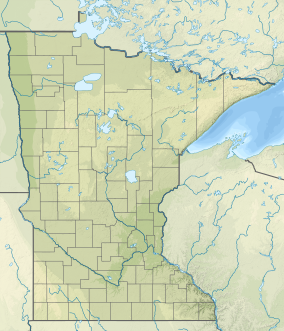|
William O'Brien State Park
William O'Brien State Park is a 1,520-acre (6.2 km2) state park of Minnesota, USA, along the St. Croix River. Its hiking trails traverse rolling glacial moraine, riparian zones, restored oak savanna, wooded areas and bogs. It is a popular place for birdwatching, picnics, camping, cross-country skiing, canoeing, fishing, and other typical outdoor recreational activities. The park is located approximately two miles north of the town of Marine on St. Croix, Minnesota. WildlifeThis park is home to raccoons, white-tailed deer, foxes, minks, beavers and woodchucks. Birdwatchers often spot various raptors, woodpeckers, bluebirds, orioles, herons, and a variety of warblers. HistoryThe St. Croix river valley was inhabited by Dakota and Ojibwe tribes. European trappers commercialized the fur-trade in the 17th century. Extensive logging took place in the mid-19th century; white pines were the target and most other tree species were ignored. Once the white pine was gone the lumber companies were happy to sell, and a lumber baron named William O'Brien bought up much of the land for his personal estate. In 1945, 20 years after William O'Brien's death, his daughter Alice offered 180 acres (0.73 km2) along the riverfront to the state. The donation was eagerly accepted, as Minnesota did not yet have a state park near the Twin Cities, and the park was ratified by the legislature two years later. The proximity to the metro area was a mixed blessing. Land was added to the park at every opportunity, to reduce crowding and to prevent housing developments from being built right up to the boundary. In 1958‚ S. David Greenberg donated Greenberg Island in memory of his parents. Accessible only by canoe‚ the island has become a haven for wildlife and wildflowers. The park was expanded into the bluffs west of Highway 95 and a second campground added. A large tract was added in 1973, leapfrogging a rail line, and another 120 acres (0.49 km2) came in 1986. William O'Brien remains one of the top five most-visited state parks in Minnesota. Recreation
References
Sources
External links |
||||||||||||||||||


